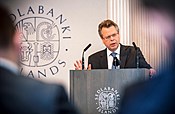Visit of IMF mission to Iceland 13-23 May 2014
A mission from the International Monetary Fund led by Peter Dohlman has today completed a two week visit to Iceland. This visit is part of the Post-Program Monitoring of Iceland´s Stand-By Arrangement, which was concluded in August 2011.
 More
More
Market expectations survey
During the period from 12-14 May, the Central Bank of Iceland carried out a survey of market participants’ expectations concerning a variety of economic variables, including inflation and interest rates. A total of 31 agents in the bond market, including banks, pension funds, mutual and investment funds, securities brokers, and licensed asset management firms were invited to participate. Responses were received from 23 market participants, giving a response ratio of 74%.
 More
More

Webcast, interest rate decision and Monetary Bulletin release
Today, Wednesday 21 May 2014, the Bank will air a webcast explaining the Monetary Policy Committee’s interest rate decision and presenting the contents of the new issue of Monetary Bulletin. The webcast will begin at 10:30 hrs. During the presentation, Már Gudmundsson, Governor of the Central Bank and Chairman of the Monetary Policy Committee, and Thórarinn G. Pétursson, Chief Economist of the Central Bank and Monetary Policy Committee member, will explain the rationale behind the Committee’s decision and summarise the contents of the new Monetary Bulletin.
 More
More
Monetary Bulletin 2014/2
Monetary Bulletin 2014/2 has now been published on the Central Bank of Iceland's website
 More
More

Statement of the Monetary Policy Committee 21 May 2014
The Monetary Policy Committee (MPC) of the Central Bank of Iceland has decided to keep the Bank’s interest rates unchanged. According to the Bank's new macroeconomic forecast, GDP growth will measure 3.7% this year, about 1 percentage point more than according to the previous forecast. Even stronger growth is projected for next year. Furthermore, the labour market continues to recover. Robust output growth will cause the slack in the economy to disappear earlier than previously forecast, and a positive output gap will develop, peaking in 2016. It is cause for concern that national saving is projected to diminish markedly and the current account surplus to turn into a deficit towards the end of the forecast
 More
More